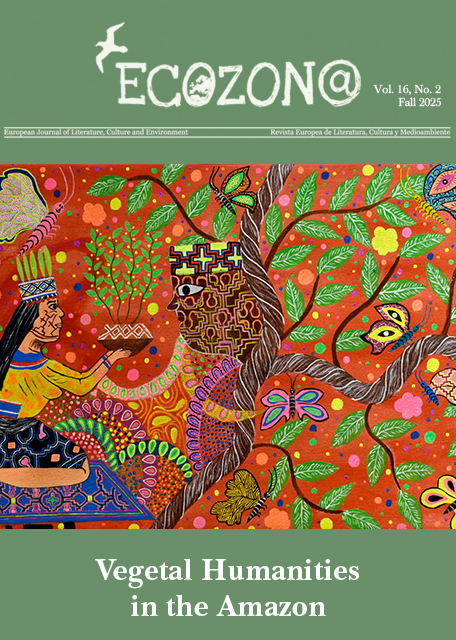<b>Writing Beyond Nature: Interview with Julian Hoffman</b> // Escritura más allá de la naturaleza: Entrevista a Julian Hoffman
DOI:
https://doi.org/10.37536/ECOZONA.2015.6.1.640Parole chiave:
Nature writing, Europe, Prespa, Julian Hoffman, ecology, culture, escritura de la naturaleza, Europa, ecología, cultura.Abstract
This interview discusses new nature writing in Europe with Greece-based writer Julian Hoffman. The dialogue explores the notion of new nature writing in Europe through Hoffman’s practice, from the legacies and influences of the tradition and the contemporary development of the form to the ecological, political and social considerations of the places and people that inform and inspire his work. Focusing in particular upon Hoffman’s 2013 publication The Small Heart of Things: Being at Home in a Beckoning World (Athens and London: University of Georgia Press), the discussion explores the ways in which the work approaches and accounts for the complex environmental and political geography of the region of the Prespa Lakes, described as a “transboundary park” bordering Greece, Albania and the former Yugoslav Republic of Macedonia. Exploring the interconnected attention that Hoffman directs towards the nature, history and politics of the area, the discussion explores the possibilities of social and cultural engagement in nature writing. Further, it examines the ways that Hoffman’s approach is informed by the particular complexities of the cultural and ecological landscapes of Prespa, addressing conceptions of nature and of place in borderlands and at the margins between regions. Additionally, the exchange explores Hoffman’s use of digital media to mix the tradition of nature writing with photography.
Abstract
Esta entrevista analiza la nueva escritura de la naturaleza en Europa con el escritor afincado en Grecia Julian Hoffman. El diálogo explora la noción de nueva escritura de la naturaleza en Europa a través de la práctica de Hoffman, desde los legados e influencia de la tradición y el desarrollo contemporáneo de la forma hasta las consideraciones ecológicas, políticas y sociales de los lugares y la gente que forman su trabajo. Centrándose en particular en la obra de Hoffman de 2013 The Small Heart of Things: Being at Home in a Beckoning World (Athens and London: University of Georgia Press), el análisis explora las formas en que el trabajo aborda y representa la compleja geografía medioambiental y política de la región de los lagos Prespa, descrita como un “parque trans-frontera” conlindante con Grecia, Albania y Macedonia. Explorando la atención interconectada que Hoffman presta a la naturaleza, la historia y la política de la zona, se analizan las posibilidades de compromiso social y cultural en la escritura de la naturaleza. Además, examina las formas en que el enfoque de Hoffman abarca las complejidades particulares de los paisajes culturales y ecológicos de Prespa, abordando los conceptos de naturaleza y lugar en las zonas fronterizas y los bordes entre regiones. Asimismo, el intercambio explora el uso que hace Hoffman de los medio digitales para mezclar la tradición de la escritura de la naturaleza con la fotografía.
Downloads
##submission.downloads##
##submission.additionalFiles##
Pubblicato
Fascicolo
Sezione
Licenza
Authors who publish with this journal agree to the following terms:
a) Authors retain copyright and grant the journal right of first publication with the work simultaneously licensed under a Creative Commons Attribution License that allows others to share the work with an acknowledgement of the work's authorship and initial publication in this journal (CC BY-NC for articles and CC BY-NC-ND for creative work, unless author requests otherwise.
b) Authors are able to enter into separate, additional contractual arrangements for the non-exclusive distribution of the journal's published version of the work (e.g., post it to an institutional repository or publish it in a book), with an acknowledgement of its initial publication in this journal.
c) Authors are permitted and encouraged to post their work online (e.g., in institutional repositories or on their website) prior to and during the submission process, as it can lead to productive exchanges, as well as earlier and greater citation of published work (See The Effect of Open Access).










